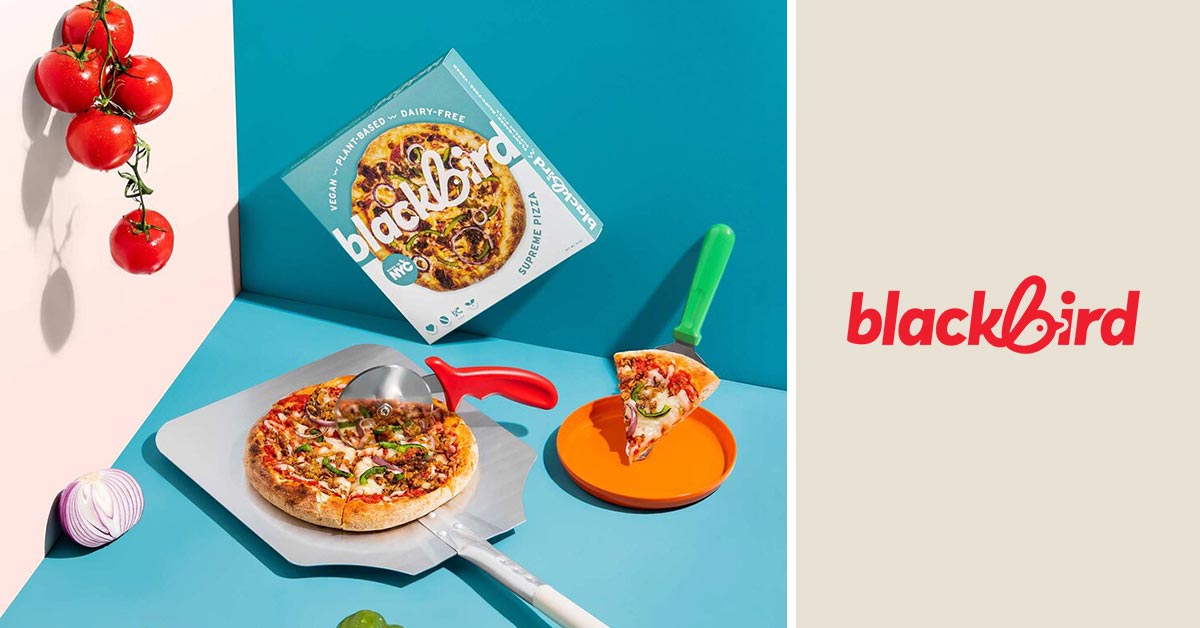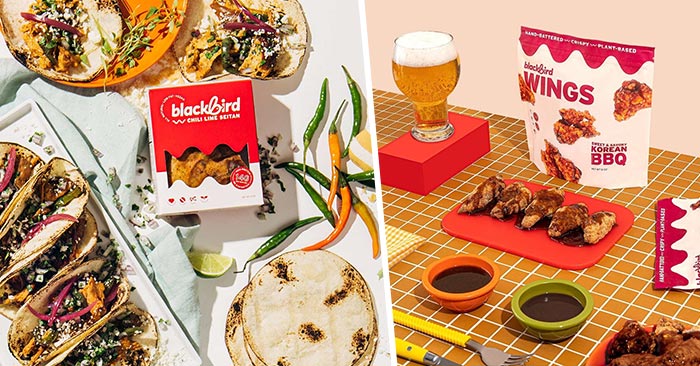Blackbird Foods Looks Beyond Pizza for Growth

Drawing from one founder’s culinary career and the other’s CPG operations background, Blackbird Foods is bringing a hand-made approach to a vegan frozen food brand.
What started in 2020 as the offshoot of a New York City-based fast casual restaurant’s hand-crafted seitan has evolved into a nationally distributed vegan frozen pizza brand. Now, it has expanded into other plant-based meat products and is targeting mainstream retailers with the “goal to displace conventional animal products,” said co-founder Emmanuel Storch
Co-founded by Mike Pease, a former chef and vegan restaurant owner, and Storch, who ran operations for Simply Gum, Blackbird Foods’ strategy is to build the company through self-manufacturing, while making inroads with conventional retailers through partnerships with other plant-based meat companies and maintaining revenue through an existing network of over 350 foodservice accounts.
Seitan is a wheat-based meat alternative long familiar to vegans and vegetarians – but the frozen pizzas have been the key to casting the company’s net wider, giving flexitarians and other potential consumers the opportunity to encounter the substitute in a familiar format. Pizza is key to “meeting the consumer where they are,” Storch said. “We find consumer education to be a really big challenge especially for small brands like us.”
The company offers six SKUs of its hero product, (Pepperoni, Buffalo, Supreme, Margherita, Kale-Mushroom and BBQ). Now its four varieties of stand-alone seitan (Original, Rosemary Garlic, Chili Lime and Texas BBQ) and recent move into frozen appetizers this year with its Korean BBQ and Classic Buffalo seitan WINGS have opened it up to new consumers. Blackbird also has further deconstructed its pizzas, selling its plant-based cheese (used on its pizzas) and plant-based sausage crumbles as foodservice products with increasing success.
The brand has two new WINGS flavors planned to launch later this year.

Launched in January 2020, Blackbird began distributing seitan and pizzas locally to independent grocers in the New York City area. Incrementally, that distribution spread to other independents throughout the Northeast. Its first foray out of its home market came at the end of its first year, when SoCal specialty grocery chain Erewhon approached Blackbird Foods about bringing the pizzas to Los Angeles.
That partnership opened Blackbird up to distributors like UNFI, which has paved the way for the brand to get on-shelf in other natural grocers like Whole Foods and Sprouts, Storch said.
Last October, Target brought the brand into 300 stores, marking Blackbird’s entrance into mainstream retail. The vegan food maker is now in about 3,000 stores, adding grocery chains like Fresh Market, ShopRite and Giant Foods to the mix.
“For 2024, our goal is to gain more and more distribution in the conventional space and really prove that these products belong there and can have a wide appeal to consumers,” Storch said.
To fuel its growth, both in manufacturing and distribution, Blackbird is expecting to raise a series A round In the new year. Previously, the company raised over $2.25 million in a seed round led by Lever VC in March 2021. It added another $250,000 this past year via a crowdfunding round that closed in September.
Pizza continues to be a prime category for reaching new consumers in the frozen aisle. About 60% of frozen food shoppers have expressed an interest in plant-based frozen meal entrees, according to data from the American Frozen Food Institute, with frozen pizza dollar sales up 11.6% in 2022. Despite inflationary challenges, the category was still between 4% to 5.5% through the first two quarters of 2023, the trade group reported.
The frozen pizza category has felt increasingly competitive in recent years, especially for better-for-you brands jockeying for shelf space. But there is consumer demand for more variety, with category assortment up only 1% versus a year ago and down 5% since 2019, retail data firm Circana reported in a webinar earlier this year.
Still, despite increased demands from shoppers for better-for-you alternatives, for vegan CPG companies, the challenge is convincing conventional grocery buyers to put plant-based products on shelf, Storch said. One strategy that the company has utilized is partnering with recognizable plant-based brands like Beyond Meat or Daring Foods on some of Blackbird’s pizzas, uplifting both brands in the process.
“What we’re really trying to foster in this plant-based space is that we’re a united front,” Storch said. “If one of us succeeds, buyers will see that there is an appetite for these types of products and be able to expand their sets and allocate more slotting to plant-based items.”
That push for success includes having other brands utilize its 3,000 sq. ft. facility on a co-manufacturing basis in the coming year.
Blackbird is “dedicated” to providing emerging plant-based brands an opportunity to expand in the market by offering a fully vegan, plant-based and kosher certified facility to partner with and grow their respective brands because it can be “pretty hard to find” reliable plant-based co-packers, Storch said.

















